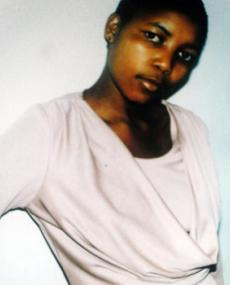
Nokuthula Simelane
Nokuthula Orela Simelane was born in 1960 in Mzinoni Township near Bethal in Mpumalanga. She was the first of two daughters (Nokuthula and Thembisile) of Ernestinah and Matthew Simelane. She graduated on 15 October 1983 from the University of Swaziland with a Bachelor in Administration (B.Admin) degree in Social Sciences majoring in Public Administration and had already secured employment for herself before her untimely 'disappearance'.
Whilst studying at the University of Swaziland she joined uMKhonto we Sizwe (MK) as a courier server and became an activist in Swaziland for the African National Congress (ANC). Her parents suspected that she was working on underground work for the ANC when correspondence was delivered at her uncle’s place in Swaziland. Concurrent with that, were regular and random visits to her uncle’s place by the Special Branch questioning Nokuthula’s whereabouts and linkage with the ANC.
It is also important to note that Simelane was the cousin of Barney Molokoane, an ANC operative who was part of the unit responsible for the SASOL 1 and 2 bombings and died after the1985 Sasolburgh in a shoot out with the police. Simelane was instrumental in arranging accommodation for Barney to stay with her family in Mzinoni when his unit was in South Africa to fulfil their underground missions.
Just before her graduation, Simelane 'disappeared' in 1983 while on an ANC mission to South Africa from Swaziland. She travelled to South Africa under the pretext of going to buy her graduation attire at that time.
She was called to a meeting on September 10, 1983, arranged in the underground parking of the Carlton Centre in Central Johannesburg. She was to meet an undercover Special Branch police officer whose real name was Norman Khoza but commonly known as 'Scotch'. By this time, Scotch had infiltrated MK and was sent on a mission to kidnap Nokuthula.
Simelane was arrested and transported to Norwood where she was tortured and forced to reveal the nature of her relationship with the ANC, including the work she was doing for the ANC and key figures of ANC operatives in Swaziland. She was later moved to a farm believed to be in Vlakplaas in the Northern district of the North West Province where she was tortured by numerous police operatives until she died.
In 1985, after 2 years of tireously searching for her or her remains, her family approached the media in search of their daughter. The family sent her pictures to newspapers and she was identified by a policeman who kept guard of Nokuthula at Vlakplaas Police Station. The policeman pointed out that the last time he saw Simelane, she was in a poor state as she had been brutally assaulted and as a result she became ill. Her 'missing case' was re-opened under the Investigating Officer, Neville Toms. The case was investigated exhaustively; however, nothing came out of the case as Nokuthula's remains were not found.
After the fall of Apartheid, the Truth and Reconciliation Commission (TRC) was instituted as a way of bridging the divide between the oppressive National Party race and the democratic South Africa. The Simelane family filed her case with the TRC in the hope of resolving her case. Five white men applied for amnesty relating to Nokuthula's abduction, torture and disappearance, Wellem Hellem Johannes Coetzee, Anton Pretorius, Mong, Williams and Ross. In the TRC a former commander of the Soweto Intelligence Unit (SIU), Wellem 'Timol' Coetzee, the man responsible for the disappearance and death of Nokuthula, stated that Nokuthula was alive when he last saw her, the unit had turned her into a spy and redeployed her back to Swaziland.
Coetzee's argument was countered by his colleague, Veyi who confessed that she was tortured and brutally murdered and was buried around the Rustenburg area. The TRC ruled against Coetzee's amnesty with regards to torture but was granted amnesty for Nokuthula's abduction. The TRC further awarded amnesty to the other four men (Pretorius, Mong, Williams and Ross) for torturing her. Thus far, no one has come forth and taken responsibility for her disappearance, neither the ANC nor former apartheid security forces.
Since her death, Nokuthula Simelane's life has been memorialised in various forms. On November 28, 2009, a life-size statue of Nokuthula was erected and unveiled in Bethal by the Mpumalanga Government to honour her legacy and contribution towards the liberation struggle. The memorial also includes a plaque inscribed with a poem produced by her family. The statue memorialising Simelane has, however, been subject to not only vandalism but also theft. In 2006, 'Betrayal', a documentary film on the life and disappearance of Simelane was released and broadcast on television. Directed by Mark Kaplan, the film gives an account of Simelane's family's grief, their pursuit of her whereabouts and the truth about her abduction, torture and death. To varying degrees, the film not only provides a biographical account of Nokuthula Simelane, but also of the various role-players in her life and death. Simelane has also been honoured in a painting called 'Ode to Nokuthula' by Christa Myburgh. The painting depicts her in a white dress and footware in her hands. Futhemore, in January 2019, the African National Congress Women’s League Young Women’s Desk (ANCWL YWD) launched the Nokuthula Simelane brigade, a volunteer brigade for the then upcoming general elections.